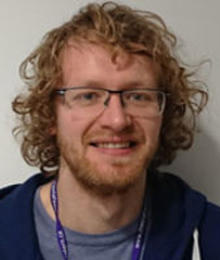An interview with Dr Lee Sherry
January 2020
Dr Lee Sherry is a Postdoctoral Researcher in molecular virology at the University of Leeds and a member of the Microbiology Society. His research looks at the ways of producing next-generation virus-like particle vaccines, and in this interview, he tells us more about how his research is helping to eradicate disease and why microbiology matters.

Tell us more about your research?
I am a molecular virologist working with Professor Nicola Stonehouse and David Rowlands at the University of Leeds. In my current role as a postdoctoral researcher, I am working on a World Health Organization (WHO) funded project to produce a next-generation vaccine against poliovirus.
Why does vaccination matter to microbiology?
In 1988 there were over 350,000 cases of poliomyelitis (polio) worldwide, leading to the introduction of the Global Eradication Initiative (GPEI), which has reduced the number of polio cases by over 99.9%, with the virus now only endemic to Afghanistan, Pakistan and Nigeria. Following the success of the current vaccines against poliovirus, WHO have recently announced the eradication of wild poliovirus type 3 (WPV3), meaning that both wild type poliovirus type 2 (WPV2) and WPV3 are no longer circulating anywhere in the world.
Despite this success, there are still biosafety concerns surrounding the current inactivated poliovirus vaccine (IPV) and the oral live attenuated poliovirus vaccine (OPV), especially as the number of vaccine-derived cases of polio have begun to outstrip the number of cases caused by WPV in recent years. Therefore, to ensure that poliovirus is eradicated, we need an alternative vaccination strategy that no longer relies on the production of infectious viruses.
How is your research helping to eradicate disease?
As part of a WHO-funded consortium (together with the Universities of Oxford, Reading, Florida, the National Institute for Biological Standards and Control [NIBSC], John Innes Centre and The Pirbright Institute); we are attempting to address these concerns by producing virus-free, virus-like particle vaccines (VLPs). These VLPs mimic the structure of the virus without containing any genomic material, therefore making these particles non-infectious and removing the risk of any vaccine-derived poliomyelitis cases.
An important aspect of this work is to provide a vaccine that can be produced in a system that is easily scalable to produce the millions of doses required each year and accessible for production in low- and middle-income countries (LMICs). Therefore, at the University of Leeds, we are generating poliovirus VLPs using Pichia pastoris (yeast), as this expression system is not only cheap in terms of media costs and infrastructure, but is currently licensed for the production of human vaccines against two other viral pathogens: hepatitis B virus and human papillomavirus (HPV). We believe that this work can lead to the next-generation poliovirus vaccine for a polio-free world.

